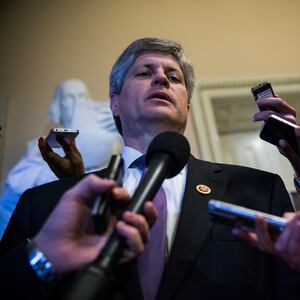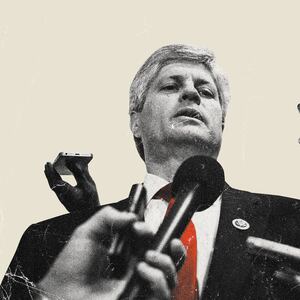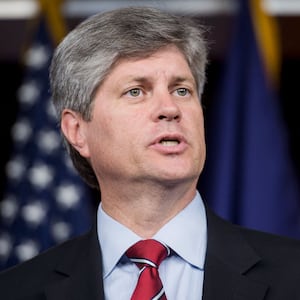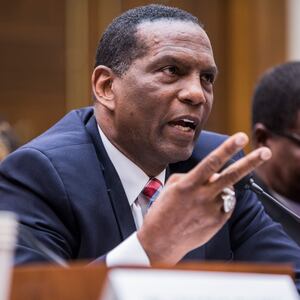Indicted Rep. Jeff Fortenberry (R-NE) may have just staked his political career—and possibly his freedom—on a tried-and-true excuse: Bad cell phone reception.
Attorneys for Fortenberry, who on Thursday became the first sitting member of Congress to stand trial in 21 years, told a federal jury that what the government calls lying to the FBI could boil down to a misunderstanding stemming from “a bad cell phone connection.”
The government’s case against the nine-term Republican hangs largely on that phone call, which a cooperating informant recorded in 2018. In that nine-minute conversation, the informant—a Fortenberry donor—told the congressman that $30,200 in campaign contributions at a Los Angeles fundraiser “probably” came from an illegal source: a Lebanese-Nigerian billionaire Fortenberry knew and had met at least twice.
ADVERTISEMENT
While Fortenberry had several “off-ramps” to admit his knowledge, prosecutors told jurors, he chose instead to lie. The Nebraska conservative now stands trial in the U.S. District Court for the Central District of California, where he faces three felony charges related to misleading the government, each carrying a maximum sentence of five years.
“This is a case about choices, a series of choices that the defendant made that led him down an illegal path of lies and deception,” Assistant U.S. Attorney J. Jamari Buxton said in his opening remarks.
The defense, however—casting itself to the jury as “guardians of Congressman Fortenberry’s liberty”—countered that Fortenberry’s statements were less about deception, and more about reception, appealing to jurors’ own experience with spotty cell service.
Defense attorney Glen Summers said Fortenberry made “one small mistake,” chalked up possibly to something he “misheard over a bad cell phone connection.”
Summers argued the claim in question—that the contributions “probably did come from” the foreign billionaire—was just “one very vague statement” made to Fortenberry during the recorded call. And the congressman, Summers said, goes “on autopilot” during fundraising chats, a state of mind that lends to distraction, where even a small glitch in the call could have warped his understanding.
“They assume that he heard it, that it registered, and that he remembered it about a year later,” the attorney told the jury. (The judge previously blocked the defense’s request to call a memory expert at trial.)
“He never lied to the agents,” Summers said, characterizing the accusation as “a failed memory test.”
“When you really look at it, it’s clear as mud,” he said.
The opening arguments came after a courtroom kerfuffle the previous day that may raise constitutional questions about the trial’s procedure.
The presiding judge, Stanley Blumenfield, has restricted press access to the courtroom. On Wednesday, during the jury selection process, Blumenfield initially penned all media in a satellite room with a video feed, and prohibited electronic devices. Likewise, Blumenfield blocked remote video and audio access.
The ban, which may run afoul of the Constitution, particularly frustrated Nebraska media, who traveled to Los Angeles to cover the trial of their local congressman only to find themselves iced out. And while Blumenfield opened the courtroom to a handful of press that afternoon, including the Nebraskans, the first hours of jury selection were off limits—an issue that in 2019 forced a federal judge to restart a trial.
More press were allowed inside for opening arguments Thursday, and Blumenfield gave the green light for reporters outside the courtroom to use electronic devices to take notes and send emails.
As for the trial itself, prosecutors must show that Fortenberry “knowingly and willfully” lied to investigators. They’ve built a sprawling case.
According to a prosecution memo filed last month, in the disputed nine-minute recorded call, the informant—who was cooperating with the FBI—“repeatedly discussed” with Fortenberry the fact that the $30,200 in cash flowed to the campaign through conduit donors, and was likely sourced to the foreign billionaire, Gilbert Chagoury.
The informant, named in filings only as “Individual H,” was revealed in court this week as Dr. Elias Ayoub, a Los Angeles-area physician who hosted the fundraiser where the illegal donations were made.
Over those nine minutes with Ayoub, prosecutors say, Fortenberry “did not express surprise or concern or seek clarification” about the claim that he’d received illegal foreign contributions from people he knew—people “who sought his legislative support during the time period he received the illegal donations. Instead, the memo says, he “continued to push” Ayoub to host a second fundraiser, asking for “some continuation of the fine generosity” from the first.
The call is one of more than 50 audio and video recordings the prosecution turned over to the defense team ahead of the trial, supplemented with more than 11,600 pages of “written communications, reports, transcripts, articles, and other records.”
The prosecution also has an array of witnesses. The first to take the stand on Thursday afternoon was FBI agent Todd Carter, who conducted the first interview with Fortenberry. In his testimony, Carter said that, to him, lying about political contributions is a red flag, possibly indicating other crimes may be afoot—noting “bribery” specifically.
That prompted Judge Blumenfield to issue some clarifying statements to the jury, reminding them that Fortenberry had not been charged with bribery, “and you should not conclude or draw any inference that the defendant committed an act of bribery.”
The defense will cross-examine Carter on Thursday evening and into Friday, but he’s just the first in line.
Prosecutors will also call campaign finance attorney Jessica Furst Johnson, of Hogan Lovells, to testify against her former client—an exceedingly rare occurrence.
Fortenberry had contacted Johnson shortly after his call with Ayoub. However, according to court filings, he did not get into any details with Johnson on that call, only mentioning an “unremarkable and unmemorable ‘concern’ about something he heard.”
Johnson could not extract more information, prosecutors say, and decided she could not advise Fortenberry on “unverifiable innuendo” about a possible “bad check.” The campaign paid Hogan Lovells $212.50 for Johnson’s time, but did not disgorge the illegal contributions until the following year, after the second of Fortenberry’s interviews with the feds.
For its part, the defense argued in opening remarks Thursday that Johnson had previously known Fortenberry as the “boy who cried wolf,” so she “blew him off” when he had called with questions about the fundraiser. (Fortenberry appears to have never paid any of Johnson’s firms before that call.)
Fortenberry’s then-fundraising lead, Alexandra Kendrick, will also take the stand.
According to prosecution filings, Kendrick “repeatedly emphasized” to Fortenberry that the 2016 fundraiser carried a risk of illegal foreign contributions. She spoke from experience, prosecutors say, and recounted a “cautionary tale” to Fortenberry about an event she ran for a different client with ties to foreign nationals “from the same community,” who ended up making illegal donations.
At the Fortenberry event, Kendrick had donors fill out the required forms in front of her, “and she made sure defendant was aware that she was taking these cautionary steps,” the memo says.
Prosecutors also note that Fortenberry himself thought the money smelled funny.
Shortly after the 2016 event, they say in court filings, he asked one of the conduits if “anything was wrong” with the fundraiser, pointing out that “the money had all come from one family.” The conduit told him, falsely, that it was all kosher.
As for Fortenberry’s defense strategy, it centers largely on undermining the government’s credibility and relying on that famous “beyond a reasonable doubt” burden of proof.
From the beginning, the defense has attempted to paint investigators as unfairly targeting Fortenberry, including calling lead FBI agent Carter racist in a court filing. Blumenfield, however, ordered that document physically stricken from the record, barred Fortenberry from arguing that the case was politically motivated, and tossed a slew of other motions ahead of the trial.
Still, Fortenberry’s counsel told jurors Thursday that the FBI had it out for Fortenberry all along, claiming that agents had planned to “feed” the congressman information that would “set up” charges down the road.
“Their intention was not to get information … no, it was to indict Congressman Fortenberry,” Summers told the jury, claiming that the FBI “ambushed” the Congressman at home under a “ruse” of national security concerns. (Fortenberry voluntarily requested a second interview, in which he also allegedly lied.)
Further, the charges of lying were merely sour grapes, the defense said, coming only after the investigation into the donations, code named “Operation Titan’s Grip,” became a “big nothing-burger.”
That part isn’t entirely accurate.
The feds became aware of the Fortenberry contributions during an investigation into Chagoury, who eventually agreed to pay a $1.8 million fine for making a total $180,000 in illegal gifts to U.S. officials, including Fortenberry. (Ayoub also inked a plea deal.) The officials include Fortenberry’s fellow Nebraskan, former Rep. Lee Terry, along with Rep. Darrell Issa (R-CA) and Utah Sen. Mitt Romney’s presidential campaign.
However, only Fortenberry was indicted.
Last October, Issa told Politico, “No, I don’t have the same issues [as Fortenberry],” noting that he “made no statements to any FBI—or anything else.”
But if misleading government officials is a crime, Fortenberry appears to hav3 violated that standard as recently as this week.
On Tuesday, he notified the Clerk of the House of Representatives that he would have to vote by proxy, “due to the ongoing public health emergency.”









